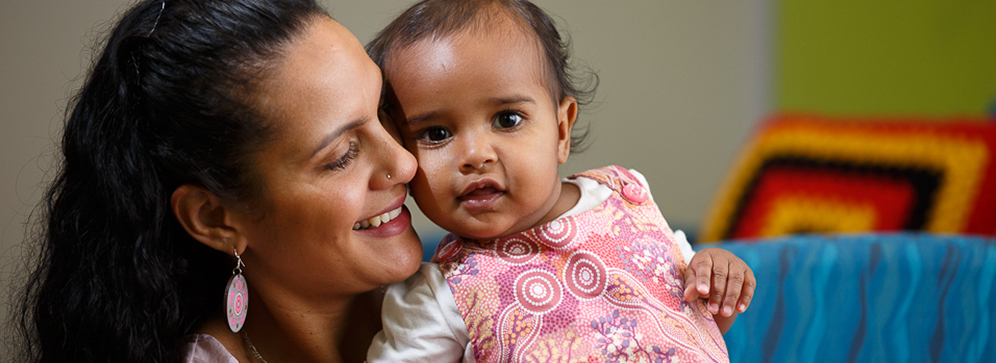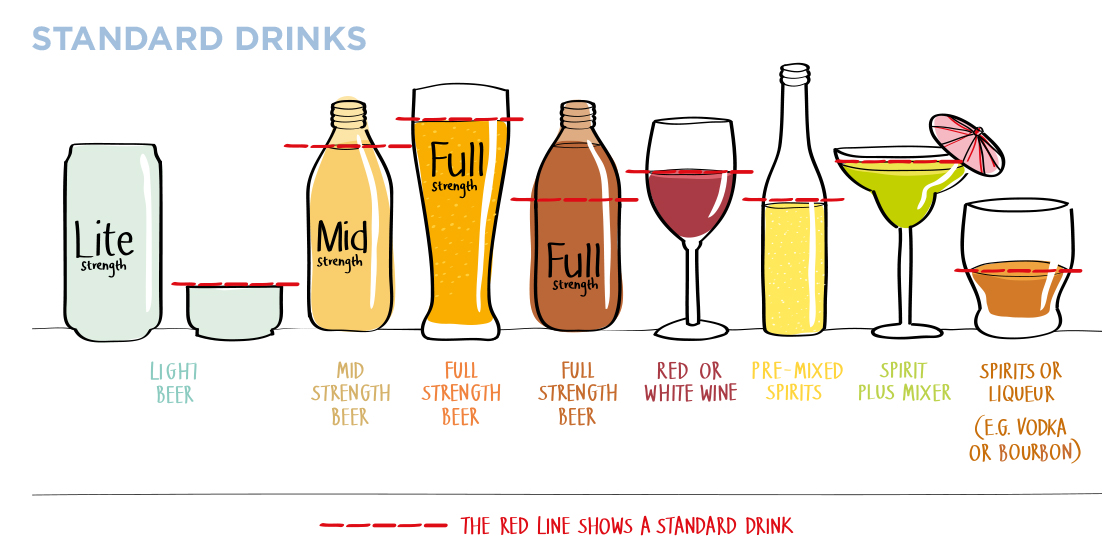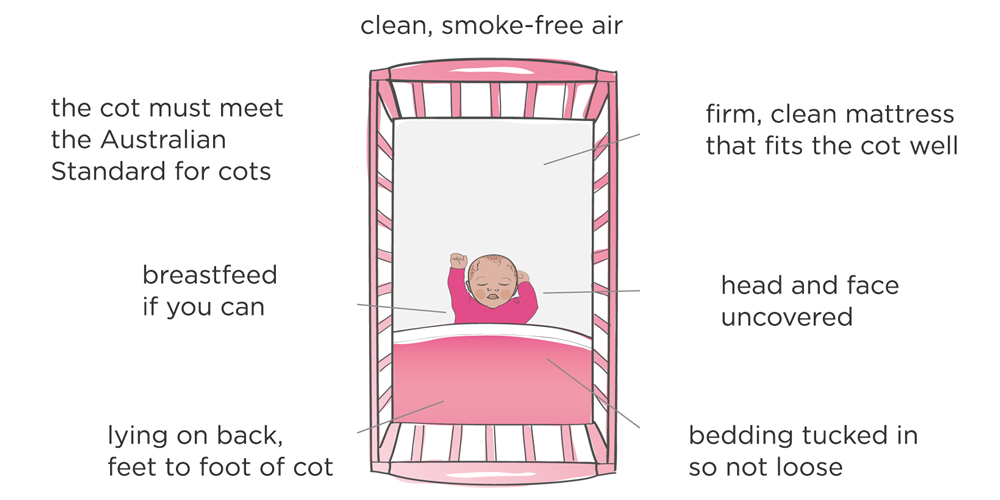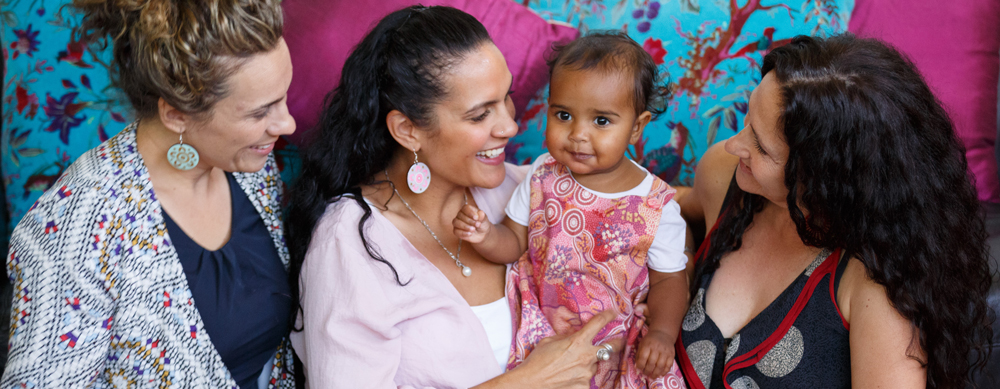You and your boorai: taking care during pregnancy
This resource is for Aboriginal and Torres Strait Islander women who are pregnant and their families who are affected by alcohol and other drugs.
We use the word boorai in this resource, because it is common to many Aboriginal languages throughout Victoria. The resource will be used by families from outside Victoria and we hope you understand the importance of using words that are meaningful to our local communities.
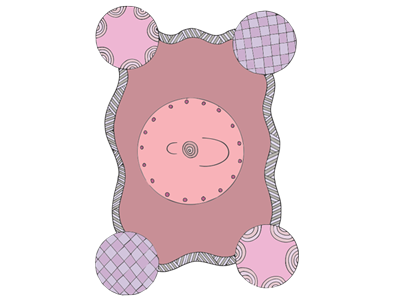
The Mother and Boorai Circle
The large sitting symbol represents the mother and the smaller sitting symbol the boorai. The circles between them represent the eternal bond they share; the circle does not have an end point. As the circles grow larger so does their bond. The four larger circles that connect around them represent health, love, support and positivity. These four elements are important to surround our boorais with; from conception through pregnancy, birth and beyond.
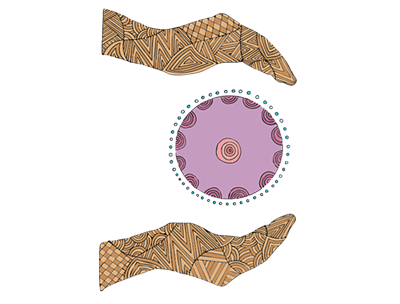
Healthy Boorai
The smallest circle in the centre represents a healthy boorai beginning as an egg in their mother’s womb. Each circle that surrounds it represents growth and development of the boorai. The semi-circles on the outer represent all the supports needed to raise a healthy boorai. It represents the mother, father, aunties, grandparents, close friends and family, health professionals and other support services. It is the responsibility of the whole community to ensure our boorais grow up strong and healthy. Finally, the hands wrapped around the sacred boorai circle represent holding, nurturing and loving our boorais.
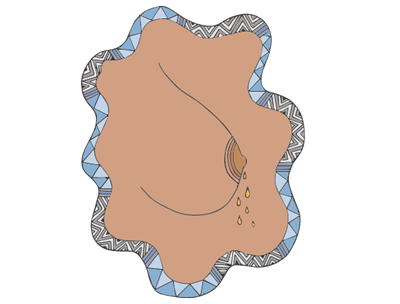
Breastfeeding
The image is of the breast. The yellow drops are colostrum, the special milk that a woman makes in the early days of breastfeeding. Nutritionally, colostrum is very beneficial for your boorai. The path around the image is your journey around breastfeeding. Some women will breeze through while others will have challenges. With good support, persistence and patience though, breastfeeding can be one of the most amazing bonding experiences. Artist: Shakara Montalto, Gunditjmara
“They told me that bubs can already hear my voice. It makes it so real” —Sophie

YOU AND YOUR BOORAI
What you can do for your Boorai
CONNECT with an Aboriginal and Torres Strait Islander support service.
UNDERSTAND how alcohol, cigarettes or the drug you are taking affects your pregnancy.
GET HELP so that you and your boorai can be well.
HAVE REGULAR pregnancy appointments to make sure your boorai is growing and is well.
TAKE SIMPLE STEPS to eat well and exercise.
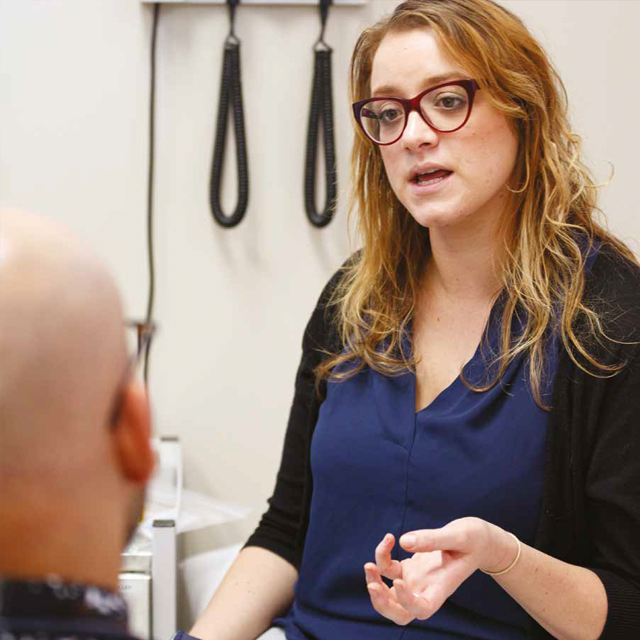
What we can do for you and your boorai
THE POWER OF YARNING A professional counsellor is someone outside of your family, who can help you to make positive changes in your life. They can support you to feel calmer and to find ways to stop using drugs. Your health service can support you to find a counsellor.
PREGNANCY CARE Regular visits with a doctor or midwife are important for making sure that your boorai is growing well.
Some hospitals have an Aboriginal Liaison Officer on site. Some have special maternity care programs for Aboriginal and Torres Strait Islander women.
Local Aboriginal Health Organisations have a Koorie Maternity Service where you can see both a midwife and an Aboriginal Health Worker. Health workers are trained to ask all patients if they are Aboriginal or Torres Strait Islander. This is to make sure that you are offered the support that is available to you.
CONNECT WITH YOUR BOORAI During pregnancy, your boorai is already getting to know you. They can hear your breath, your heartbeat and they can hear the sound of your voice and the other voices around you. Your boorai will use these sounds to feel secure and comforted from the beginning. At only 24 weeks of pregnancy, you and your boorai are already getting to know each other.
WORKSHEETS
Click on the titles below to open in a browser and print.
“Being pregnant makes me want to eat better. I’m a pretty good cook… My aunty drops in food sometimes too… think about what vitamins and nutrition the baby might need.” —Zoe
EATING WELL FOR YOU AND YOUR BOORAI
Eating good food will help you to feel stronger, more energetic and able to cope better with stress. Different kinds of good food every day will give you the vitamins, minerals and nutrition you and your boorai need. Eating well is not always easy.
Healthy Tips
- Try to eat at least three meals a day.
- Don’t let yourself get too hungry.
- Main meals should include some meat, chicken, fish or eggs with salad or vegetables.
- Eat more bush foods, freshly cooked fish and shellfish.
- Eat less fatty meats such as sausages and pies, tinned corn beef and spam.
- At other times of the day, have a low fat, low sugar snack.
- Eat more fruit and vegetables. If you don’t eat fruit, then have more salad or vegetables. If you don’t eat vegetables, have fruit.
- Don’t have too much tea, coffee or coke and avoid ‘energy’ drinks, as they have too much caffeine.
- If you’re thirsty drink more water.
- Ask a friend or family member to cook or shop for you if you can’t do it yourself.
Healthy snacks:
- fruit, fresh or canned in natural juices
- handful of dried fruit and nuts
- corn cob
- cheese and crackers
- yoghurt or a cup of milk with Milo
- a slice of fruit bread.
Quick and easy meals:
- eggs on toast
- cheese toasties
- baked beans
- peanut butter or avocado on toast
- a bowl of cereal such as wheat biscuits, muesli or porridge
- tinned soup and toast
- tinned tuna or sardines with salad or toast
- four bean mix with salad
- hot fresh take-away chicken with vegetables or salad
TEETH
“I just didn’t think about my teeth and that bad teeth might affect the baby. I actually had a tooth taken out in late pregnancy. It was a bit scary. I look after them very well now.” —Madeline
Looking after your teeth is especially important if you take methadone.
Bad teeth and gums can cause your boorai to be born too early.
Try and visit a dentist.
If you are pregnant and you have a concession card, dental care is free and you don’t have to wait.
To find your local dental service, call 1300 360 054.
BRUSH REGULARLY
Sometimes it’s hard to brush your teeth when you are feeling sick.
DENTAL CHECK-UPS
Regular check-ups are important and even more so when you are a drug and alcohol user.
Brush at times when you are feeling ok and at other times wash your mouth out with water (especially after vomiting).
TRY AND VISIT A DENTIST
SMOKING
“Giving up smoking when I was pregnant was easy. But after the baby was born I found it hard not to start again. I had a few after the baby was born…then I gave myself rewards when I didn’t have one…” —Andrea
SMOKING WHEN YOU ARE PREGNANT CAN:
- lead to stillbirth, miscarriage and premature birth
- stop your boorai from growing properly
- affect your boorai’s ability to breathe properly after the birth
- lead to SIDS (Sudden Infant Death Syndrome).
WHAT YOU CAN DO
TALK to a doctor, they can help.
REMEMBER every cigarette you don’t smoke is good for your boorai.
CALL QUITLINE 13 78 48
WHAT CAN FAMILY DO?
STOP smoking around pregnant women.
GIVE UP smoking too.
AND REMEMBER…
EVERY cigarette you don’t smoke during pregnancy is a positive step for both of you.
A SMOKE FREE pregnancy is best for your boorai.
AFTER YOUR BOORAI IS BORN
No-one should smoke around pregnant women and boorais.
If you, your partner or members of your family continue to smoke after your boorai is born you will need to:
- smoke outside
- only handle your boorai wearing clothes that don't smell of smoke
- wash your hands and face after smoking and before touching the boorai
- never smoke in the car, especially if there are kids in the car.

